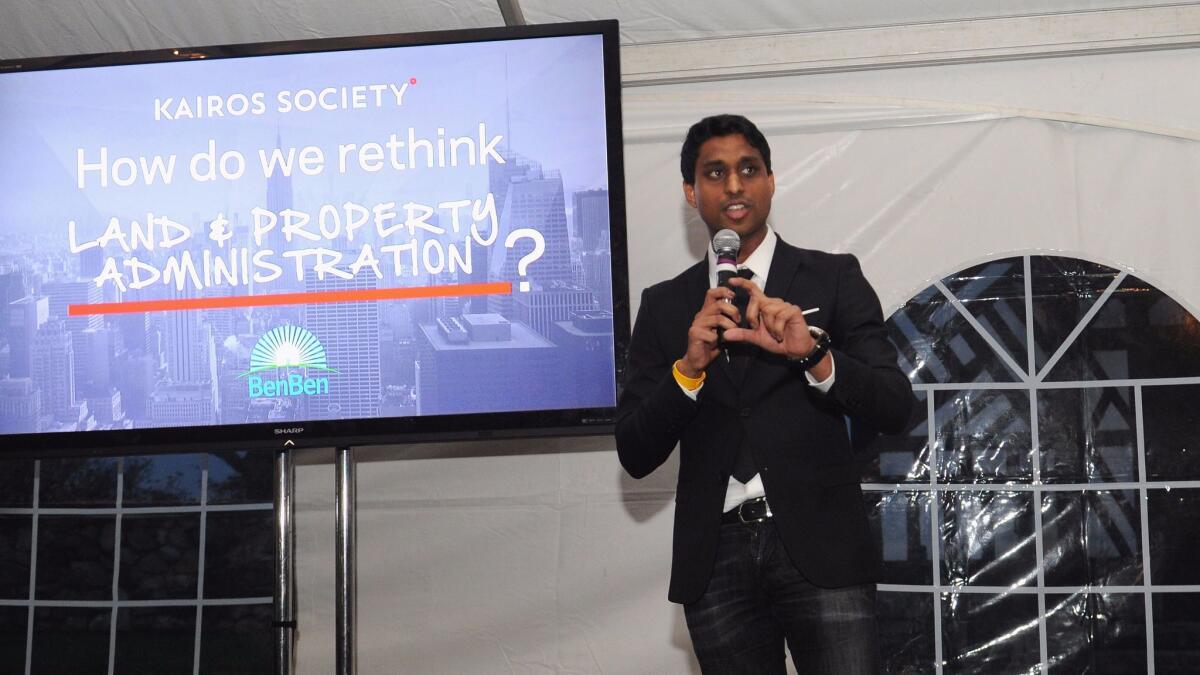Forget $700 juicers — this venture fund wants to help solve middle-class problems

- Share via
Reporting from San Francisco — Silicon Valley investors love to fund companies that solve problems. But the start-ups that get funded aren’t always the ones tackling issues that are most pressing to the average American.
Venture capital firm and start-up incubator Kairos wants to change that with a $25-million fund announced Thursday.
Rather than backing companies that build products for the financially comfortable, such as $700 juicers or $1,499 tea infusers, it will fund companies looking to solve problems for the less comfortable: the shrinking middle class, people riddled with student debt, workers who have lost their jobs, and those worried about being able to afford childcare, retirement and healthcare as they get older.
Bankrolled by Ankur Jain, a partner at Kairos best known for selling his contacts organizing start-up Humin to Tinder last year, the fund is relatively small compared with typical venture capital funds. But it is comparable to other pre-seed and seed funds, in which founders receive checks for only tens or hundreds of thousands of dollars to get their businesses off the ground.
Although Kairos has not yet announced the companies that have benefited from its latest fund, Jain said it has been writing checks that range from $250,000 to $1 million to founders. Companies in the firm’s existing portfolio include those that tackle care for the aged, customer service and childhood nutrition.
Funded start-ups will gain access to an advisory board that includes MetLife Chief Marketing Officer Esther Lee; Michael Dubin, founder of Dollar Shave Club; celebrity doctor Mehmet Oz; Vicente and Marta Fox, the former president and first lady of Mexico; and Bobbi Brown, the founder of Bobbi Brown Cosmetics.
“Tech is in some ways more powerful than government now,” said Jain, who sees the fund as a way for Silicon Valley to solve some of the problems it either helped to create or exacerbate.
“A lot of the anger in this last election was about jobs, and people were getting angry about immigrants,” Jain said. “More jobs have been lost because of technology than immigration.”
The fund shares a similar philosophy to a growing number of venture capital firms — such as Kapor Capital in Oakland, Susa Ventures in San Francisco, and Trend Discovery in New York — that invest in companies that they believe can have a positive effect on society while also generating a return on investment.
But it also exists in part as a response to Silicon Valley’s penchant to build products that solve problems for the wealthy.
In launching the fund, Jain took a swipe at the now-defunct start-up Juicero, which raised $120 million in venture capital funding to build a $700 juicer. The company went bust this year after a Bloomberg video showed that juice could be extracted just as easily by hand-squeezing Juicero’s proprietary juice packets as with the $700 machine.
Some firms that have sought to solve seemingly trivial problems have also gone belly up. Teforia, the maker of the $1,499 tea infuser, went out of business in October after it failed to raise additional funds. The start-up had previously raised $17 million.
Other companies have recently come under fire for tone-deafness and announcing products perceived by the public to be out of touch.
A start-up created by two former Google employees found itself on the receiving end of social media vitriol when it announced in September a vending machine stocked with nonpersishable items that could be placed in gyms and dorms. After social media users lashed out, saying its name — Bodega — and its business model seemed intent on upending the humble corner store, the founders apologized. Still, the company had managed to raise $2.5 million, according to TechCrunch.
“We’re at an inflection point,” said Michael Kocan, a partner at Trend Discovery, which has no relation with Kairos. “You still have a lot of pitches [from founders] that are the next web app or mobile app, but we’re also seeing more pitches that combine hardware and data analytics to reduce problems like food waste.”
Part of this change, Kocan said, is being driven by the fact that the low-hanging fruit of the start-up economy has, for the most part, been picked by the Facebooks, Googles, GrubHubs and Snapchats of the world. That means founders and funders are seeing less opportunity in creating another photo-sharing app or food-delivery service amid an increasingly crowded market.
“There’s not as much profit to be made by making incremental web and mobile apps as there would have been in the past,” Kocan said. “But there’s a lot of profit to be made solving problems for the middle and working class.”
Another reason for the change: As socially conscious millennials decide to start companies or move into venture capital, they’re bringing with them their desire to work on something meaningful, said Seth Berman, a general partner at Susa Ventures.
“The reality is that all people love a feel-good story and the satisfaction of working toward something bigger than themselves,” Berman said.
“It’s what drives a lot of us,” Kocan said. “They’ve seen these challenges in their own lives, and now the tools are available and they want to be the ones to solve it.”
Twitter: @traceylien
ALSO
Senate tax bill ditches stock option change after outcry from tech start-ups
TV stations are about to track you and sell targeted ads, just like Google and Facebook
Tech companies pushed for net neutrality. Now Al Franken wants to turn it on them







